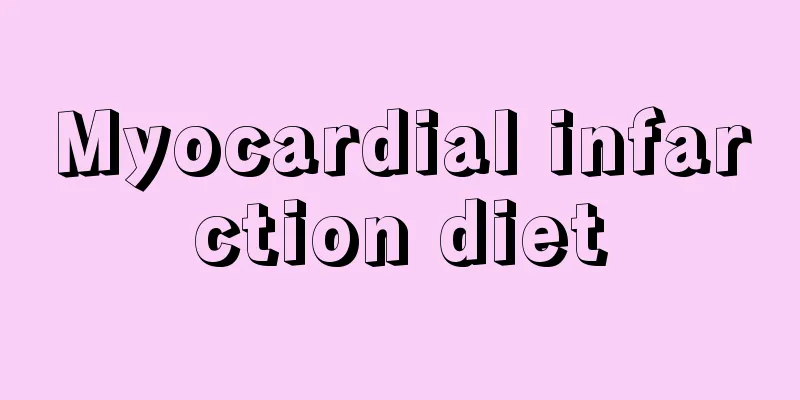Myocardial infarction diet

|
With the continuous development of science and technology, people's living standards have been greatly improved. However, the health of our bodies has not improved as people's living standards have improved. Instead, it has been declining as people's living standards have improved. The incidence of diseases of affluence such as hypertension, obesity, myocardial infarction, etc. is also increasing, and the rise of these diseases is closely related to people’s lifestyle and eating habits. High-fat, high-sugar, high-salt eating habits coupled with lack of physical exercise put us in a sub-healthy state, and these bad eating habits cause many diseases, myocardial infarction being one of them. For patients with myocardial infarction, we need to control our diet. Let us learn about it below. 1. Acute phase. Within 3 days after the onset of the disease, you must stay in bed and rest, and all activities (including eating) require special care. 1 to 3 days after the onset of the disease, the patient should mainly eat liquid food, and may be given a small amount of vegetable water, degreased broth, rice soup, porridge, fruit juice, lotus root powder, etc. Any solutions that cause bloating or irritation, such as soy milk, milk, strong tea, etc., should not be consumed. Avoid excessive heat or cold to prevent heart arrhythmia. Attention must be paid to the sodium, potassium and magnesium in food. A low-salt diet is generally recommended, especially for patients with heart failure. However, since sodium loss is common in urine after an acute myocardial infarction, excessive sodium restriction may also induce shock. Therefore, it must be adjusted appropriately according to the condition of the disease. 2. Remission period. Within 4 days to 4 weeks after onset, as the condition improves, you can gradually switch to a semi-liquid diet, but you should still eat small and frequent meals. Meals should be light, nutritious and easily digestible. Porridge, cereals, evaporated milk, lean meat, fish, poultry, vegetables and fruits are allowed. Food should not be too hot or too cold, and the gastrointestinal tract should be kept open at all times to prevent excessive straining during bowel movements. After 3-4 weeks, as the patient gradually resumes activities, the diet can be relaxed appropriately, but the intake of fat and cholesterol should still be controlled. Large meals (especially those high in fat) should be avoided because they can cause another myocardial infarction. However, the diet should not be overly restricted to avoid malnutrition and increase the patient's mental burden. 3. Recovery period. Four weeks after onset, as the condition stabilizes and the patient's activity level increases, the daily calorie intake can generally be maintained at around 1000 kcal to 1200 kcal. Adequate amounts of high-quality protein and vitamins are beneficial to the repair of damaged areas. Dairy protein, lean meat, vegetables, fruits, etc. can be eaten, especially green leafy vegetables and fruits and other foods rich in vitamin C, which have a clearing and conductive nature and should be eaten regularly. The daily diet should also contain a certain amount of crude fiber to keep the bowels open and avoid difficulty in defecation. In addition, after the recovery period, relapse should be prevented, and dietary principles should also include maintaining an ideal weight and avoiding full meals. Quit smoking and drinking. If you have hypertension and chronic heart failure, you should limit sodium intake. 4. Pay attention to dietary adjustments during the peak season. Late autumn and winter are the seasons when myocardial infarction is prone to occur. In addition to keeping warm and preventing cold, it is also necessary to eat food that is functional and nutritious, especially various medicinal porridges. The diet of patients with old myocardial infarction can be arranged according to the diet of general coronary heart disease patients. 5. Dietary taboos for patients with myocardial infarction. Patients with myocardial infarction should avoid overeating and stimulating beverages. Overeating will increase myocardial oxygen consumption, aggravate or induce myocardial infarction. Especially after a high-fat diet, it is easy to cause increased blood lipids, increased blood viscosity, slow local blood flow, and easy platelet aggregation and coagulation, which can induce myocardial infarction. In addition, you should also pay attention to eating less foods that are easy to cause bloating, such as beans, potatoes, onions, garlic and overly sweet foods, and avoid spicy and irritating foods, such as strong tea, white wine, chili peppers, cocoa powder, coffee, etc. The above are what patients with myocardial infarction should pay attention to in their diet. From the above we can see that, in fact, patients with myocardial infarction need to pay attention to different things at different stages of the disease. Therefore, if there are patients with myocardial infarction, they need to pay special attention to what kind of diet they should have at what stage. Of course, in addition to paying attention to diet, we also need to strengthen physical exercise and enhance our physical fitness. |
>>: Mycoplasma pneumoniae positive
Recommend
Is surgical treatment the first choice for gastric cancer?
Due to the improvement of gastric cancer diagnosi...
What is the correct way to wash your hair with vinegar
Hair growth is a normal physiological phenomenon ...
The pros and cons of adding white sugar to milk powder
Everyone is familiar with milk powder. If there a...
What should you eat to prevent lung cancer? Eating more yellow and green fruits and vegetables can prevent lung cancer
In recent years, due to a series of reasons such ...
Is it harmful to the body if air enters the blood vessels during infusion?
In daily life, infusion is a common medical metho...
Why do I always get oral ulcers
Some people are particularly prone to oral ulcers...
Which blood tests require fasting?
When some people go to the hospital for a blood t...
What should I do if my feet hurt when wearing shoes
Many women experience foot pain or heel rubbing p...
What are the histological classifications of lung cancer?
What are the histological classifications of lung...
The causes of rectal cancer that need everyone's attention
There are some causes of rectal cancer that need ...
What's the matter with dizziness
Many women do not understand what symptoms they w...
Are almonds cold in nature?
Many people know that almonds have medicinal valu...
How to get rid of sleepiness quickly
Some friends who often stay up late are actually ...
What is the cleanest way to clean tiles
The usage rate of ceramic tiles is very high in o...
The best treatments for chronic sinusitis turn out to be these four
Chronic sinusitis has a great impact on human hea...









